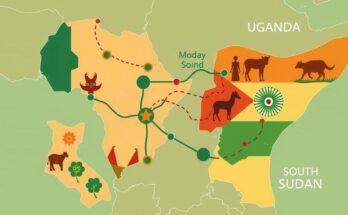Congo’s President Tshisekedi has vowed a strong response to advances by the M23 rebel coalition, which recently claimed control of Goma. Amid allegations of Rwandan support for the rebels, Tshisekedi’s address emphasized that Congo would not be humiliated. Analysts warn of potential military escalation or negotiations as the conflict continues to escalate and regional leaders push for diplomatic engagement.
Democratic Republic of Congo President Felix Tshisekedi has pledged a robust response to the rebel alliance currently besieging eastern territories rich in minerals, resulting in multiple local military surrenders. In a resolute televised address, he emphasized that Congo would not suffer humiliation or defeat, even as regional leaders facilitate negotiations with the rebels.
The AFC/M23 rebel coalition has claimed control over Goma, the largest city in North Kivu province, with this latest acquisition being part of a wider offensive in the region. Although the government has not officially confirmed the takeover, it admits that Goma is under siege. Reports indicate that the rebels are advancing towards the central regions of South Kivu after capturing additional towns.
The Congolese government has implicated Rwanda, claiming it has supplied the M23 with weapons and personnel, a charge that Rwanda has neither denied nor fully accepted. Instead, Rwanda has criticized the Congolese government for allegedly associating with a Hutu militia group, the FDLR, which is in direct contrast to the Tutsi-background M23.
President Tshisekedi was absent during a meeting of East African leaders aimed at addressing the conflict. At this gathering, these leaders encouraged Tshisekedi to engage with all parties involved, including the M23. Rwandan President Paul Kagame, present at the meeting, asserted that dialogue and understanding the conflict’s nuances are essential for peace.
Amid ongoing fighting in Goma, reports indicate casualties among several individuals, including foreign peacekeepers, while hundreds have sustained injuries. Local sources have revealed that many Congolese troops have surrendered to the M23, with some international mercenaries reportedly abandoning the Congolese army.
As tensions escalate, analysts suggest two potential scenarios for the future of the conflict: either negotiations will commence prompted by M23 control of Goma, or the Congolese government may pursue military action, potentially intensifying the conflict. Tshisekedi has previously threatened military confrontation with Rwanda, to which Kagame responded defiantly, reiterating readiness for conflict.
The ongoing conflict in the eastern Democratic Republic of Congo is primarily driven by rebel groups vying for control of mineral-rich territories. The AFC/M23, a rebel coalition formed from previous armed factions, has recently made significant territorial gains, prompting concerns from the Congolese government and regional leaders. This conflict is further complicated by accusations of foreign involvement, notably from Rwanda, which has historical ties to the region’s ethnic divisions following the 1994 genocide. The situation remains tense, with local governments, international bodies, and regional stakeholders seeking solutions to stabilize the area.
In summary, President Tshisekedi has declared that the Democratic Republic of Congo will not succumb to humiliation from the advancing rebel forces. The conflict in eastern Congo, particularly in Goma, poses significant challenges involving military surrenders, alleged foreign collaboration with rebel forces, and calls for dialogue among regional leaders. As the situation unfolds, the Congolese government faces critical decisions that could alter the trajectory of this conflict, with potential military and diplomatic consequences.
Original Source: edition.cnn.com




